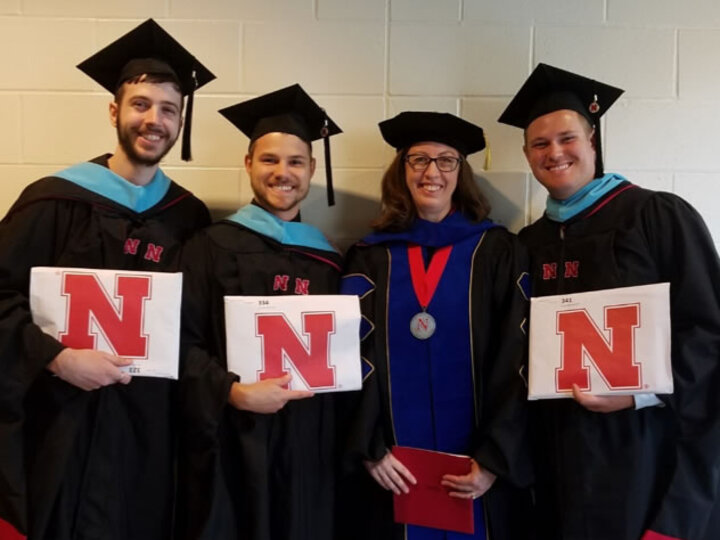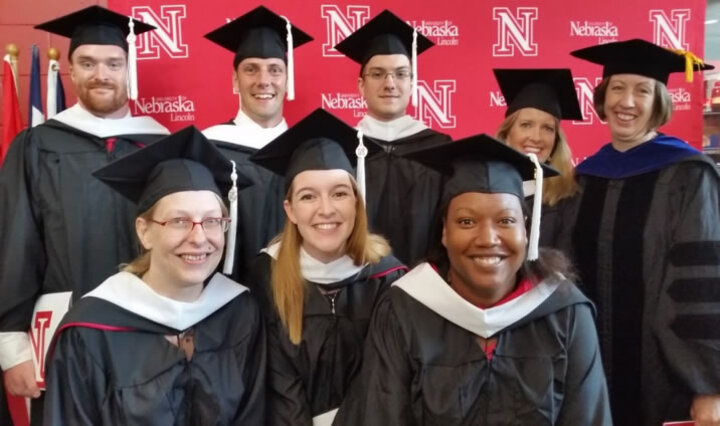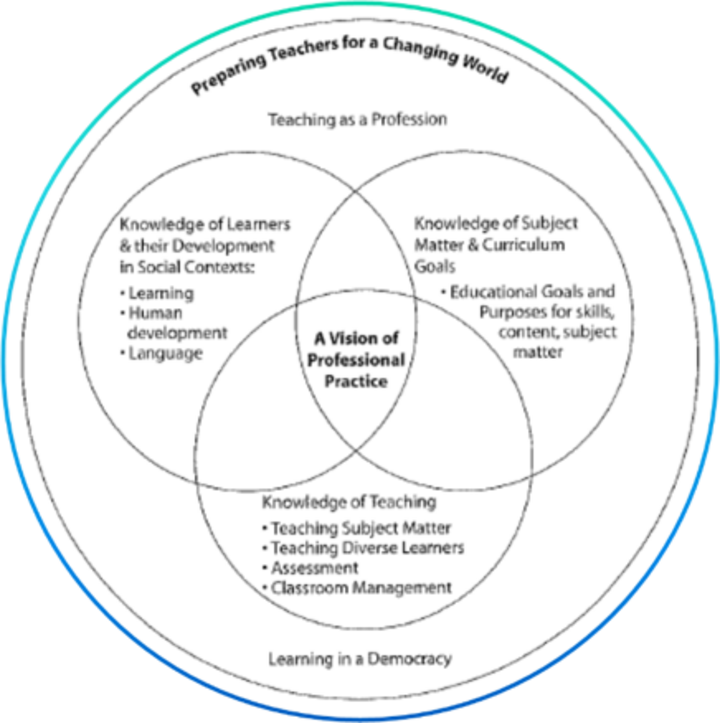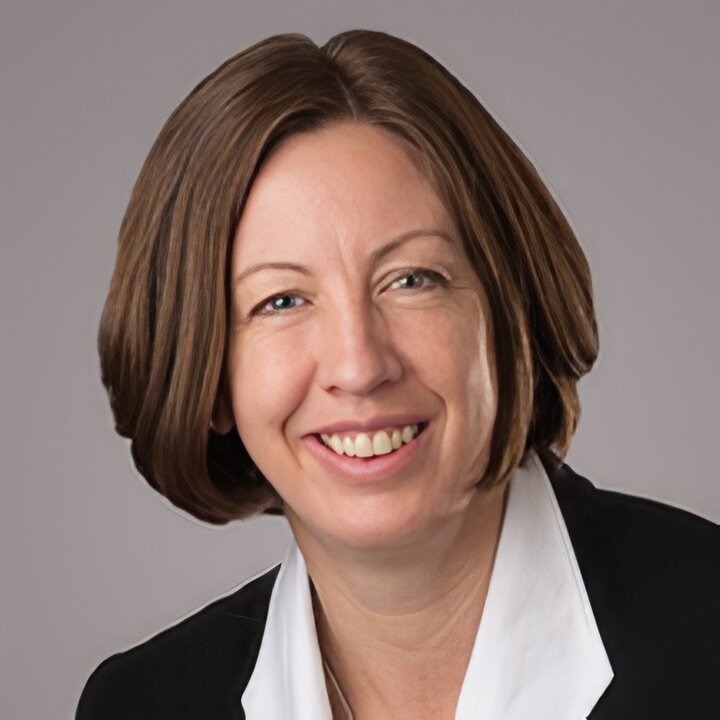In this website we present a summary of the on-going production of results and accomplishments supported by a National Science Foundation (NSF) Robert Noyce, Track I, Phase II grant awarded to UNL in September 2015. Our project has built upon our prior Noyce Track I, Phase I grant (2010-2016) that supported the development of a new 14-month Master’s level teacher preparation program at UNL.
Both NSF Noyce grants have provided preservice teacher preparation program support, in the form of stipends, for UNL to recruit science majors and working professionals to become science teachers. With the completion of the Phase I and II grants, in total 90 MA-level science teacher candidates were provided with Noyce $12,000 to $16,000 Noyce stipends in return for a two-year commitment to teach in a high-need school or school district. The Noyce Track I, Phase II grant’s research focus, led by TLTE faculty member Dr. Elizabeth Lewis, has been to conduct a longitudinal study of beginning and mid-career science teacher graduates to identify key attributes of effective teacher preparation and instructional practices. This was investigated by comparing the resulting teaching practices of UNL graduates from two secondary (grades 7-12) science teacher education programs: (a) the four-year undergraduate science education major (with a science minor) that meets the state’s minimum teacher certification requirements, and (b) the Master of Arts program that producing secondary science teachers with undergraduate degrees in a field of science that meets the federal definition of a “highly qualified teacher.”
Read more.

OVERVIEW

The 14-month Master of Arts with emphasis in science teaching (MAst) program was established in the UNL College of Education’s Department of Teaching, Learning, and Teacher Education with support from the National Science Foundation’s (NSF) Robert Noyce program.
The MAst program engages science professionals in a research-informed teacher preparation program that supports them in meeting the challenges of the modern American secondary science classroom.

The MAst program at UNL was designed using Darling-Hammond & Bransford’s (2007) vision of professional practice (see Figure 1), which describes a comprehensive teacher knowledge framework for educating a new generation of teachers. The three major intersecting areas that are important for any teacher to acquire knowledge of are: (a) learners and their development in social contexts; (b) subject matter and curriculum goals; and (c) teaching. Other research findings about the importance of preparing teachers to teach diverse students was also used to inform the selection of foundational coursework, specifically teaching emergent bilinguals in the content area and education in a pluralistic society. In the program MAst teachers completed coursework in how to conduct teacher action research and conducted their own capstone study during their student teaching placement.
In May 2019, the MAst program enrolled its 9th cohort of preservice science teachers, producing an average of 10 new science
teachers per year. From our longitudinal study of our graduates from the undergraduate and MAst programs, we have found that over time, MAst alumni teachers have maintained a positive outlook on their agency as effective teachers of science. We attribute their positive self-efficacy to a rigorous teacher preparation program that built upon strong roots of in-field science content knowledge. Many of our first MAst preservice science teachers who graduated in 2012 and 2013 are now in their 6th and 7th years of teaching. Over seven cohorts the program has boosted a successful retention rate of 90% of employed teachers who have stayed in the classroom gaining greater expertise through reflective teaching practices.
Read more.
In the News
Learn more about the NSF Noyce Science Teacher Grants at UNL from the following news feature stories:
(1) Noyce grant funds tuition for new science teachers.
(2) UNL presents research on longitudinal study of beginning science teachers at NSF Noyce Conference.
(3) Master of Arts in science teaching (MAst) celebrates first six years.
RESEARCH
We have focused our investigation of science teacher preparation on analyzing potential differences between two routes to science teacher certification using pre-post program graduation systematic data collected on preservice teachers. This rich dataset has included collecting teacher demographic information, science subject matter knowledge via formal education (college transcripts assessed for in- and out-of-field science credit hours and GPAs), clinical experiences, emergent pedagogical knowledge and instructional practices, teaching self-efficacy, and beliefs about reform based science teaching and learning). We investigate science teachers’ beliefs, self-efficacy, instructional practices, and overall effectiveness (specifically: student learning, teacher retention, and dropout rates). We also test two models of teacher preparation that connect attributes of teacher preparation and effective science teaching and disseminate key findings on science teacher preparation and teacher effectiveness to teacher educators and science education leaders and associations.
Science Teacher Preparation
For decades the research base in the United States provided little empirical evidence of what knowledge and skills science teachers need in order to be effective teachers (NRC, 2010; Cochran-Smith, 2005). Existing research pertaining to secondary science preservice teachers (PSTs) had been limited in the areas of: (a) mastery of subject matter knowledge (i.e., how much is enough?), (b) teaching self-efficacy, (c) curricular practices, and (d) clinical experiences (NRC, 2010). A critical report on teacher preparation produced by the National Research Council (2010) focused the field of educational researchers to investigate the transfer of teacher preparation knowledge and skills to the classroom. In response to this call for research we have asked the following important questions:
(1) Becoming an effective teacher takes “good” preparation, time, and practice….but how much?
(2) Preservice teacher education, even robust preparation, cannot immediately prepare teachers to be effective teachers, but some preparation designs are better than others, but which ones?
(3) At some point the effects of teacher preparation programs attenuate, but when?
The field of science education has needed more studies that carefully describe the relationship between science teachers’ preservice preparation and enacted reformed-based teaching practices. Our program of research has addressed this knowledge gap by investigating beginning science teachers’ NGSS-aligned instructional practices with a range of in-field content knowledge and relationships to exemplary, reform-based instruction (see Figure 2).
Read more.

PUBLICATIONS
Implications for Science Teacher Certification Policy
Grant Dissemination Reports & Brochures
Lewis, E.B., Lucas, L., Tankersley, A., & Hasseler, E. (2019). Why domain-specific science knowledge matters in teacher certification: Focusing on evidence for effective science teaching. University of Nebraska-Lincoln. Informational brochure on science teacher certification and subject matter knowledge expertise produced for Nebraska school administrators, teacher educators, and other stakeholders.
Lewis, E. B., Augustyn, L., Garrett, A. Lucas, L., Musson, A., Rivero, A. & Frederick, A. (2016). Noyce science teacher Master of Arts with emphasis in science teaching program: Meeting challenges of 21st Century Classrooms. UNL Noyce Track I, Phase I, Final Report. Faculty Publications: Department of Teaching, Learning and Teacher Education. 238.
Teachers’ Instructional Practices
Peer-reviewed Book Chapter
Lewis, E.B., Rivero, A., Musson, A., Lucas, L., Tankersley, A., & Helding, B.A. (2020). Chapter 4: Educating Effective Science Teachers: Preparing and Following Teachers into the Field. In J. Carinci, S. Meyer, and C. Jackson (Eds.), Linking Teacher Preparation Program Design and Implementation to Outcomes for Teachers and Students. Charlotte, NC: Information Age Publishing, pp. 87-129.
Dissertations
Lucas, L.L. (2019). Development of technology integration practices of beginning secondary science teachers: Analyzing gateways and barriers in the first five years (Unpublished doctoral dissertation). University of Nebraska-Lincoln.
Musson, A. A. (2018). Getting to the why: Exploring early-career physical science teachers' discourse and assessment practices (Unpublished doctoral dissertation). University of Nebraska-Lincoln.
Rivero, A.M. (2017) Bonding ideas about inquiry: Exploring knowledge and practices of metacognition in beginning secondary science teachers (Unpublished doctoral dissertation). University of Nebraska-Lincoln, Lincoln.
Manuscript under Review
Rivero, A., & Lewis, E.B. (under review, 5/25/21). What’s in your toolbox? Exploring beginning secondary science teachers’ conceptual understanding and use of metacognitive strategies. Journal of Science Teacher Education.
Manuscript in Preparation
Musson, A. & Lewis, E.B. (in prep). Getting to the why: Exploring early career physical science teachers’ discourse and assessment practices.
Teacher Subject Matter Knowledge and Misconceptions
Journal Article
Lewis, E. B., Rivero, A., Lucas, L, Musson, A., & Helding, B. (May 2021, online view: https://onlinelibrary.wiley.com/doi/epdf/10.1002/tea.21709). Setting Empirically Informed Content Knowledge Policy Benchmarks for Physical Science Teaching. Journal of Research in Science Teaching, xx(x), xx-xx.
Manuscripts Under Review
Tankersley, A., Hasseler, E., Lewis, E.B., & Lucas, L. (under review, 3/24/21). Teachers’ use of NGSS Scientific Practices in Diverse Classrooms. Journal of Science Teacher Education.
Rivero, A., & Lewis, E.B. (under review, 5/25/21). What’s in your toolbox? Exploring beginning secondary science teachers’ conceptual understanding and use of metacognitive strategies. Journal of Science Teacher Education.
Lucas, L. L. & Lewis, E.B. (under review, June 2021). Connections between secondary science teachers’ technology integration concerns and instructional practices. Technology, Pedagogy and Education.
Inquiry-based Science Teaching
Manuscript in Preparation
Lewis, E.B., Lucas, L., Tankersley, A., Hasseler, E., Helding, B. (in prep). Models of early and mid-career secondary science teachers’ inquiry-based teaching. Science Education.
Lewis, E.B., Lucas, L., Tankersley, A., Hasseler, E., Rivero, A. & Helding, B. (in prep). Predictors of effective secondary science teaching. Science.
Peer-reviewed Conference Proceeding
Rivero, A. & Lewis, E. (2020). Reflection and Inquiry-based Teaching: Exploring Reflective Practices in Beginning Secondary Science Teachers. In Levrini, O. & Tasquier, G. (Eds.), Electronic Proceedings of the ESERA 2019 Conference. The beauty and pleasure of understanding: engaging with contemporary challenges through science education, Part 3, Strand 3 Science Teaching Processes (co-edited by Sabine Fechner & Roald Verhoeff), (pp. 320-329). Bologna, Italy: Alma Mater Studiorum- University of Bologna. ISBN 978-88-945874-0-1.
Lucas, L. & Lewis, E.B. (2018). Modeling Inquiry-oriented Instruction of Beginning Secondary Science Teachers. In Finlayson, O., McLoughlin, E., Erduran, S., & Childs, P. (Eds.), Electronic Proceedings of the ESERA 2017 Conference. Research, Practice and Collaboration in Science Education, Part 13 Pre-service Science Teacher Education (co-ed by Maria Evagorou & Marisa Michelini), (pp. 1742-1752). Dublin, Ireland: Dublin City University. ISBN 978-1-873769-84-3.
Validity Argument for Research Instruments in Science Education Research
Manuscripts in Preparation
Lewis, E.B., Lucas, L., Tankersley, Helding, B., & Baker, D.R. (in prep). Validating the Discourse in Inquiry Science Classrooms (DiISC) instrument.
Lewis, E.B., Helding, B.A., Lucas, L., & Musson, A. (in prep). Validating the BARST-L survey instrument with secondary science teachers.
PRESENTATIONS
2019
Lewis, E., Lucas, L., Tankersley, A., Hasseler, E., Rivero, A., & Helding, B. (2019). Predictors of inquiry-based science teaching. Presented at the biannual conference of the European Science Education Research Association, August 2019. Bologna, Italy.
Tankersley, A., & Lewis, E. (2019). An investigation of life science teachers’ content knowledge and persistent misconceptions. Poster presented at the biannual conference of the European Science Education Research Association, August 2019. Bologna, Italy.
Rivero, A., & Lewis, E. (accepted). Reflection and inquiry-based teaching: Exploring reflective practices in beginning secondary science teachers. Presentation proposal submitted to the biannual conference of the European Science Education Research Association, August 2019. Bologna, Italy.
Lewis, E.B., Lucas, L., Tankersley, A., Hasseler, E., & Helding, B. (2019). Measuring and Modelling How and When Effective Science Teaching Occurs. Paperset presented at the annual meeting of the National Association for Research in Science Teaching (NARST): March 31-April 3, 2019: Baltimore, Maryland.
Tankersley, A., Lewis, E., & Musson, A. (2019). Preservice and First Year Teachers’ Successes and Challenges in Enacting Inquiry-based Practices. Paper presented at the annual conference of the Association for Science Teacher Education (ASTE), January 3-5, 2019: Savannah, Georgia.
2018
Lewis, E.B., Rivero, A., Lucas, L., Musson, A., & Tankersley, A. (2018). Beginning Science Teachers' Subject Matter Knowledge, Misconceptions, and Emerging Inquiry-based Teaching Practices. Poster presented at the NSF Robert Noyce Program Annual Conference: July 16, 2018: Washington, DC.
Lewis, E.B., Rivero, A., Lucas, L., Tankersley, A., & Helding, B. (2018). Beginning Science Teachers' Subject Matter Knowledge, Misconceptions, and Emerging Inquiry-based Teaching Practices. Paperset presented at the annual meeting of the National Association for Research in Science Teaching (NARST): March 10-13, 2018: Atlanta, Georgia.
Lewis, E.B., Rivero, A., Lucas, L., Tankersley, A., & Helding, B. (2018). Setting our Priorities for Science Teacher Certification: Focusing on Evidence for Effective Science Teaching. Presentation to the University of Nebraska-Lincoln, Discipline-Based Education Research (DBER) DBER Group: STEM Ed Seminar & Journal Club.
Lucas, L., & Lewis, E.B. (2018). The Development of Technology Integration Practices of Beginning Secondary Science Teachers: Barriers and Gateways in the First Five Years of Teaching. Poster presented at the annual meeting of the National Association for Research in Science Teaching (NARST): March 10-13, 2018: Atlanta, Georgia.
Rivero, A.M., & Lewis, E.B. (2018). Bonding Ideas about Inquiry: Exploring Knowledge and Practices of Metacognition in Beginning Secondary Science Teachers. Paper presented at the annual meeting of the National Association for Research in Science Teaching (NARST): March 10-13, 2018: Atlanta, Georgia.
2017
Lewis, E.B., Rivero, A., Lyrica, L., Tankersley, A., & Helding, B. (2017). Beginning science teachers' subject matter knowledge, misconceptions, and emerging inquiry-based teaching practices. Presentation to the University of Nebraska-Lincoln, Discipline-Based Education Research (DBER) Group.
Lucas, L., & Lewis, E. (2017). Modeling Inquiry-oriented Instruction of Beginning Secondary Science Teachers. Presentation at the biannual conference of the European Science Education Research Association, August 21-25, 2017: Dublin City University, Dublin, Ireland.
Musson, A., & Lewis. E. (2017). Identifying purposes and exploring decisions: An investigation of two early career physical science teachers’ use of interactive formative assessment. Paper presented at the annual conference of the Association for Science Teacher Education, Des Moines, IA: January 12, 2017.
2016
Lewis, E.B., Rivero, A., Musson, A., Lu, J., & Lucas, L. (2016). Building Exemplary Teaching Practices: Following the Paths of New Science Teachers. Paperset presented at the annual meeting of the National Association for Research in Science Teaching (NARST): April 14-17, 2016: Baltimore, MD.
PROJECT TEAM
NOYCE PRINCIPAL INVESTIGATORS

Dr. Elizabeth Lewis, PI from 2012-2020 (co-PI 2010-2012), is an associate professor of science education in the Department of Teaching, Learning and Teacher Education (TLTE) at UNL. She is a former geologist, 9th grade Earth and space science teacher, and National Board Certified science teacher who taught in Maine and Massachusetts. Dr. Lewis received her Ph.D. in Curriculum and Instruction at Arizona State University in science education. Dr. Lewis has coordinated the UNL MAst program since its first cohort began in 2011 and has advised more than half of the Noyce recipients in their MA programs. Dr. Lewis’s research interests span science teachers’ knowledge and learning from preservice teacher preparation to in-service professional development, geoscience education issues, and teacher certification policy. She designed and led the UNL Noyce-funded longitudinal study of beginning science teachers.

Dr. Daniel Claes, co-PI, is professor and chair of the UNL Department of Physics and Astronomy. Dr. Claes, a former high school mathematics and physics teacher, is a high-energy physicist. As co-PI on the Noyce grant, he recruits potential applicants, reviews applications for incoming MAst students, and serves on faculty panels for many of the MAst students’ capstone projects showcasing classroom research about a problem of practice in teaching and learning. He has also led NSF grants that have provided teachers with professional development in cosmic radiation and physics content knowledge.

Dr. David Harwood, co-PI, is professor and Stout Chair in Stratigraphy in the UNL Department of Earth and Atmospheric Sciences. Dr. Harwood studies Cenozoic and Cretaceous paleoenvironments and paleoclimates of the southern high latitudes and Antarctic continent. He has produced many resources for teachers to use in their classrooms. Dr. Harwood also teaches a popular geology field course for teachers, which serves as a complementary professional development activity for MAst program alumni teachers. Dr. Harwood recruited applicants, reviewed applications for the MAst program, and has served on faculty panels for MAst students’ capstone projects.

Dr. Tiffany Heng-Moss, co-PI, is a professor in UNL’s Department of Entomology and dean of the College of Agricultural Sciences and Natural Resources. Her expertise includes developing interdisciplinary education projects and educational programs for undergraduate and graduate students and K-12 educators and students. As co-PI on the Noyce grant, she recruited applicants and reviewed applications for incoming MAst students. Heng-Moss served on faculty panels for many of the MAst students’ capstone projects.
Dr. Jon Pedersen, co-PI from 2012-2015 (original PI from 2010-2012), professor of science education, was the associate dean for research in UNL’s College of Education and Human Sciences (July 2011-June 2016). Dr. Pedersen co-coordinated the MAst program with Dr. Lewis for the first MAst cohort (2011-2012) and advised students in the first two cohorts. Dr. Pedersen is currently affiliated with the University of South Carolina.
UNL NOYCE GRANT RESEARCH TEAM ASSOCIATES

Dr. Lyrica Lucas was a graduate research assistant on the Noyce grant research team from 2014-2019 while pursuing her Ph.D. in Educational Studies. She was also a university supervisor to preservice science teachers in local school districts. Dr. Lucas is currently a postdoctoral research associate in the School of Natural Resources at UNL. Lucas completed her master’s degree in physics at the University of the Philippines-Diliman and continued her studies in with a Master’s degree in science education at UNL as a Fulbright scholar. As a former physics instructor, she is also interested in physics education research, particularly in the use of multiple representations for problem-solving and modeling. Her current research focuses on examining the use of technology for inquiry-based instruction among beginning secondary science teachers.

Amy Tankersley is currently a doctoral student in the Department of Teaching, Learning and Teacher Education at the University of Nebraska-Lincoln. She became a research assistant on the Noyce grant project in 2015. Ms. Tankersley has taught science methods courses and also worked as a university supervisor with preservice science teachers placed in local school districts. She is a former Oklahoma biology and environmental science teacher with her master’s degree in microbiology from the University of Oklahoma. Ms. Tankersley has also worked with local and state agencies in Oklahoma on curriculum and reform-based teaching practices.

Elizabeth Hasseler was a graduate research assistant in the Noyce project from 2017-2019. She is a doctoral student in the Department of Teaching, Learning, and Teacher Education. Ms. Hasseler is also a graduate teaching assistant teaching elementary science methods and supervising preservice science teachers. She holds her bachelors and master’s in mechanical and aerospace engineering from Cornell University. While at Cornell, she worked as a research assistant in the Laboratory for Intelligent Machine Systems on drone research. Ms. Hasseler earned her master’s in teaching from Union Graduate College (now Clarkson University). She taught physics for four years in a small rural school district in New York state where she also ran a science club, mentored a First Robotics Team, and ran a makerspace.

Dr. Ana Rivero was a graduate research assistant on the Noyce grant research team from 2013-2017 as while pursuing her Ph.D. in Educational Studies in science education. She is currently a clinical assistant professor in STEM education in the Department of Teaching, Learning, and Social Justice at Seattle University. Dr. Rivero has a master’s in education and organizational development from the University of Monterrey, Monterrey, Mexico and completed her Ph.D. in Educational Studies with a focus on science education at UNL. Her dissertation study investigated beginning science teachers’ knowledge and experiences of metacognition and reflective practices for teaching secondary science. Dr. Rivero has collaborated with Dr. Lewis’s research group on projects about the efficacy of teacher education programs developing beginning secondary science teachers’ inquiry-based teaching practices. Dr. Rivero is a former high school chemistry teacher, science department chair, and was a curriculum supervisor in a private higher education institution in Monterrey, Mexico.

Dr. Aaron Musson was part of the Noyce grant research team from 2012-2017. He earned his doctorate at the University of Nebraska-Lincoln (UNL) in Educational Studies with a focus on science education in August 2018. Dr. Musson research has focused on the assessment and discourse practices of beginning physical science teachers. As a 20-year veteran science teacher, Dr. Musson has taught mostly chemistry, but also physics and biology, in Nebraska secondary private and public schools, and in the University of Nebraska-Omaha’s chemistry department. Dr. Musson earned his master’s degree in education in curriculum and instruction from Wayne State College. While at UNL he worked as a lecturer and science teacher educator coordinating and teaching a two-semester science teaching methods course and supervised and oversaw preservice teachers’ clinical experiences. He currently teaches in Omaha Public Schools.

Dr. Brandon Helding received his Ph.D. in Curriculum and Instruction from Arizona State University in 2010. He has worked, and is published, as a methodologist, statistician, and psychometrician. Dr. Helding has worked as methodologist on four NSF-funded grants, one IES-funded efficacy study, published one book on measurement development, and co-authored a handbook chapter on design research. Additionally, Dr. Helding is or has externally evaluated social science projects, has worked as a game developer for Google and the Hispanic Research Center at Arizona State University, as a policy consultant for the Lincoln Police Department and American Civil Liberties Union, and the Arizona Department of Juvenile Detention Services. He is currently employed as UNL research faculty in the Social and Behavioral Sciences Research Consortium.

Jia Lu is a doctoral candidate in UNL’s Department of Teaching, Learning, and Teacher Education and was a graduate research assistant in the Noyce grant research team from 2012-2014 while pursuing her Ph.D. in Educational Studies in foreign language education. While at UNL, Ms. Lu has taught educational foundations courses and also worked as a practicum supervisor. She holds her bachelor’s and master’s in English Language and Literature and has taught English as a foreign language for six years.
FUNDING

Completed 2020
National Science Foundation
Robert Noyce Teacher Scholarship Program Grant (Track I, Phase II)
DUE-1540797
9/1/15-8/31/2020
PI: Elizabeth Lewis
Co-PIs: Daniel Claes, David Harwood, and Tiffany Heng-Moss
Amount: $799,890

Completed 2016
National Science Foundation
Robert Noyce Teacher Scholarship Program Grant (Track I, Phase I)
DUE-1035358
9/1/2010-8/31/2016
PI: Elizabeth Lewis (PI: 9/1/2012 - 8/31/16; co-PI 9/1/10 - 8/31/2012)
Co-PIs: Jon Pedersen (PI: 9/1/10 - 8/31/2012; co-PI: 9/1/12 - 6/31/16), Dan Claes, and Tiffany Heng-Moss
Amount: $1,194,387
